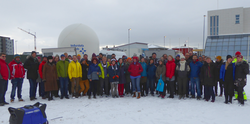EUROVOLC – a networking project kick-off meeting
A group of more than 70 Earth and atmospheric scientists from 9 European countries met earlier this month in Keflavik to start their collaboration on the Horizon2020 Infrastructure project EUROVOLC, “EURopean Network of Observatories and Research Infrastructures for VOLCanology“. The group represents 18 partners comprising volcano research and monitoring institutions, civil protection and companies from the IT and geothermal industry.
With a grant of 5 million Euros, from the EUs Horizon2020 framework, the 3-year-long project, which started on February 1st 2018, aims to construct an integrated and harmonized European volcanological community able to fully support, exploit and build-upon existing and emerging national and pan-European research infrastructures. The project is coordinated by the Icelandic Meteorological Office (IMO) and managed in collaboration with INGV in Catania, Sicily.
With over 60 active volcanic systems in Europe (e.g. Vesuvius and Etna in Italy, Bárdarbunga in Iceland, Santorini in Greece etc.), and numerous others in member states' overseas territories (e.g. Guadeloupe, Martinique, Réunion, Montserrat, Macaronesian islands), volcanic hazards present an acute threat to Europe. Predicting, preparing for and recovering from volcanic disasters and disruption therefore is a pressing concern, where the European volcanology research community plays a key role in mitigating volcanic risk and providing key scientific information and interpretation during eruption crises. This role was exemplified in the 2010 Eyjafjallajökull eruption, which despite its modest size caused €1.3 billion direct costs to the airline industry and significant impacts to general economic activity in Europe.
Volcanic systems are inherently complex, difficult to predict, present multiple hazards, and eruptions often result in cascading effects. Advances in volcanological research can therefore lead to improvements in risk assessment and crises management, with significant positive impacts on European society. In practice however, this does not happen efficiently due to: fragmentation of the volcanological community; limited time-frame of research projects retarding knowledge transfer from these projects to the wider community; wide variety of disciplines in Earth and atmospheric sciences comprising the volcanological community; lack of community test beds.
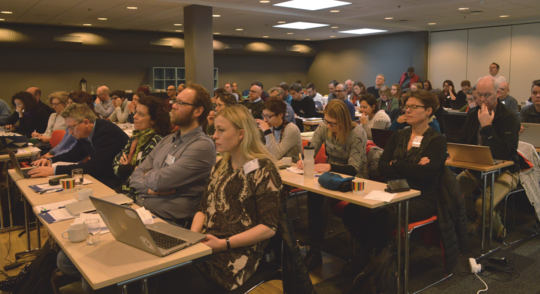
Participants at the EUROVOLC kick-off meeting. Photo: Sigurlaug Gunnlaugsdóttir.
To address the community fragmentation, the EUROVOLC project will focus on four main themes: Community building, volcano-atmosphere interaction, sub-surface processes, and volcanic crisis preparedness and risk management, with the overall aim to:
- integrate and harmonize the presently fragmented volcanological community in order to enhance knowledge transfer
- advance research on specific topics
- establish access to volcanological data from Volcano Observatories and Volcanic Research Institutions
- open access during the project to the multidisciplinary Research Infrastructures themselves
- drive best practice at Volcano Observatories,
- link scientists and stakeholders
- open pathways for enterprise to better exploit georesources such as geothermal energy in volcanic areas.
The project will exploit and build-upon existing and emerging national and pan-European research infrastructures, such as the ongoing European Plate Observing System (EPOS) and the recently established European volcanological supersites, FUTUREVOLC and MedSUV.
Examples of networking activities in EUROVOLC include collaboration and networking between Volcano Observatories, Volcano Research Institutions and civil protection agencies, networking of atmospheric gas and aerosol observations as well as observations of subsurface processes, and initiation of access to multidisciplinary observations from the Krafla Volcano Laboratory as a test bed. Joint research activities include production of services to initialize volcanic ash transport and dispersal models during eruptions, integrated modelling of pre-eruption data, the creation of a catalogue of European Volcanoes and an assembly of tools for volcano monitoring, assessment and hazard management. Transnational access will be established to European Volcano Observatories in Iceland, Italy, Azores, Reunion and the Caribbean and to modeling facilities at Volcano Research Institutions. Virtual access will be offered to various modelling and assessment tools for responding to volcanic unrest and eruptions.
For further information, contact Kristin S. Vogfjörd (IMO), coordinator of EUROVOLC.
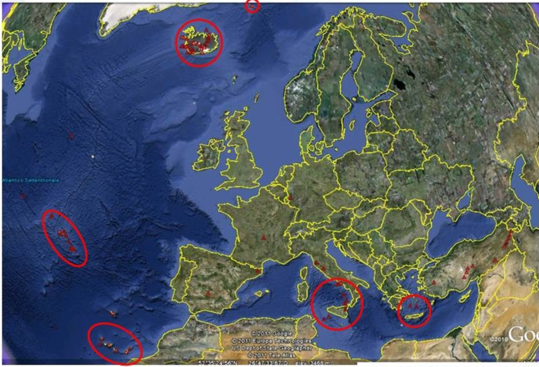
Volcanic areas in Europe marked with red circle.
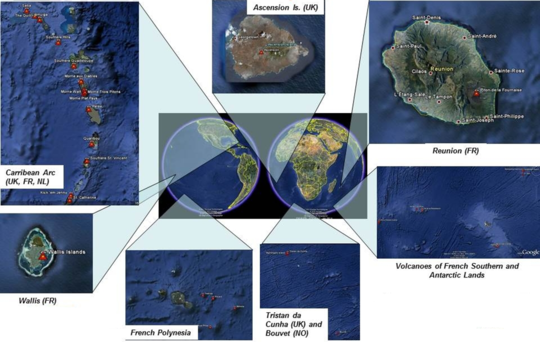
Volcanic areas where European partners conduct monitoring and research.
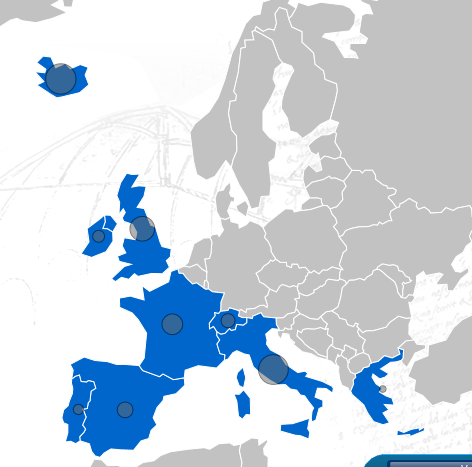
Grants distribution among the European countries.
